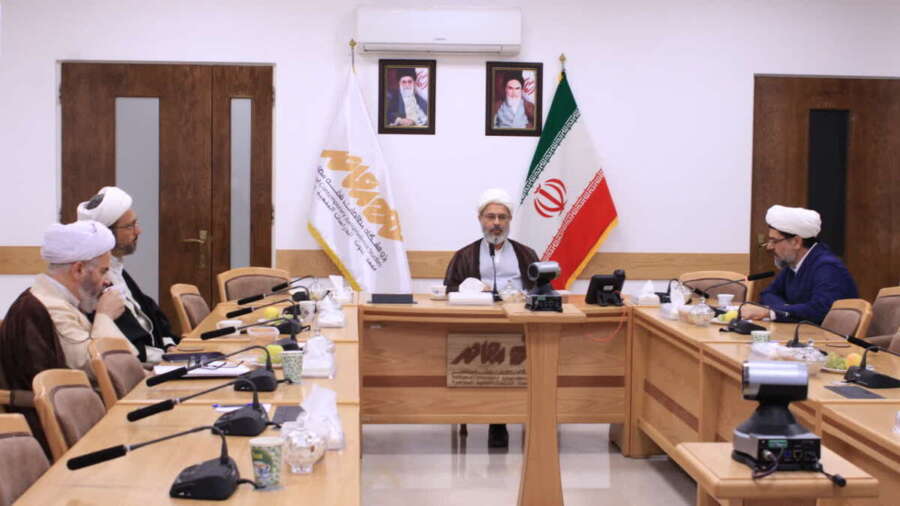Note: The issue of applying rulings to inner acts is one of the emerging and complex topics in the jurisprudence of ethics, which was examined in this scientific session through jurisprudential examples and precise critiques. The central focus was whether inner acts, such as intention, love, and purpose, are subject to sharia rulings.
According to the news portal of the Research Institute for Contemporary Jurisprudence Studies, the 231st scientific session of the Group for the Jurisprudence of Society, Ethics, and Education at this institute, titled “Feasibility of Applying Rulings to Inner Acts in the Jurisprudence of Ethics,” was held on Monday, October 13, 2025.
This session, conducted both in-person and virtually, featured Hujjat al-Islam wa al-Muslimin Mohammad Alamzadeh Nouri, Deputy for Moral and Educational Training of the Islamic Seminaries, as the presenter, and Hujjat al-Islam wa al-Muslimin Mohammad Hadi Fazeli Baboli, a member of the Scientific Council of the Group for the Jurisprudence of Society, Ethics, and Education, as the scientific critic. The session was moderated by Hujjat al-Islam wa al-Muslimin Mehdi Davoudabadi, secretary of the Research Department for the Jurisprudence of Society and Health.
At the start of the session, Hujjat al-Islam wa al-Muslimin Davoudabadi, referring to the scientific mission of the Research Institute for Contemporary Jurisprudence Studies, addressed the importance of the topic of inner acts in the jurisprudence of ethics, stating: “One of the complex and emerging issues in the jurisprudence of ethics is how jurisprudential rulings apply to inner acts, as the prevailing view limits the subject of jurisprudence to external and physical acts where human will and choice are visibly manifest.”
In continuation, Hujjat al-Islam wa al-Muslimin Alamzadeh Nouri, posing the fundamental question, “Can inner acts also be subject to sharia rulings?” presented the principles, foundations, and jurisprudential examples in this regard. In part of his remarks, he stated: “The science of jurisprudence organizes human voluntary behaviors. In its definition, it has never been explicitly stated that it only pertains to external and physical acts. Therefore, inner acts, whether intellectual or emotional, if voluntary, are subject to jurisprudential rulings.”
The Deputy for Moral and Educational Training of the Islamic Seminaries of the country, referring to numerous jurisprudential examples, considered the application of rulings to inner acts an established reality in jurisprudence and added: “The obligation of intention in acts of worship, love for the Ahl al-Bayt (peace be upon them), the intention of creation in contracts, heartfelt consent in transactions, and even faith and hypocrisy are all examples of inner acts to which jurisprudence has assigned rulings.”
Referring to the criterion for applying rulings, he emphasized human choice and will: “Wherever there is human choice and will, a sharia ruling applies. If an act is involuntary, whether physical or inner, it falls outside the scope of legislation, and the criterion is not whether it is inner or external.”
In the continuation of the session, Hujjat al-Islam wa al-Muslimin Fazeli Baboli critiqued the presented views and, raising questions, called for clarification of the basis for addressing such a topic. He stated: “I assumed there was a theory in this regard or a gap felt in the jurisprudential mind that led to raising this issue; however, it seems that even for the presenter, it is not yet clear why this discussion is considered necessary.”
Emphasizing the need for a precise distinction between acts and their prerequisites, he noted: “Every voluntary act, whether external or heartfelt, can fall within the scope of jurisprudence and be subject to rulings of obligation or prohibition. However, more work is needed to identify instances to distinguish inner acts from mere psychological states and prerequisites.”
During the scientific session, in addition to the main topic, other important issues were raised, including the necessity of expanding the scope of jurisprudence to emerging domains such as mental and emotional acts. The challenges in determining the voluntary nature of inner acts were also among the key topics discussed.
One of the notable points was the examination of the impact of modern technologies, cyberspace, and changes in lifestyle on the formation of inner and spiritual acts of humans, which was highlighted as significant in studies of ethical jurisprudence.
In another part of the discussion, the possibility of compiling new practical treatises (risalah ‘amaliyyah) in the field of the jurisprudence of ethics and heartfelt acts was examined, which could be an effective step in addressing contemporary jurisprudential issues.
Additionally, the jurisprudential basis for applying rulings to ethical traits, particularly from the perspective of their voluntary prerequisites, was critically examined as one of the important topics.
The member of the Scientific Council of the Group for the Jurisprudence of Society, Ethics, and Education at the Research Institute for Contemporary Jurisprudence Studies concluded by emphasizing that “every voluntary act, whether heartfelt or external, can be subject to sharia rulings, but more work is needed to clarify the instances and boundaries of these rulings.”
The session of the Research Institute for Contemporary Jurisprudence Studies demonstrated that every voluntary act, whether external or inner, can be subject to jurisprudential rulings, but determining precise instances and boundaries requires further studies and examination. Additionally, the necessity of considering changes in lifestyle and modern technologies in understanding inner acts was among the key points of this discussion.

